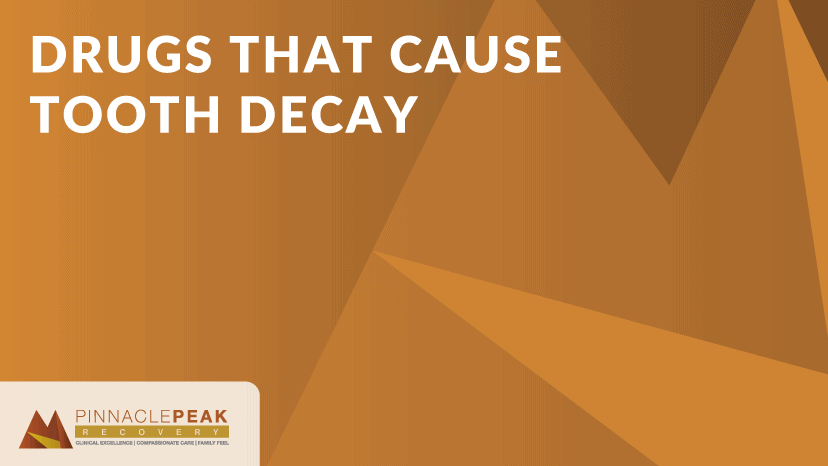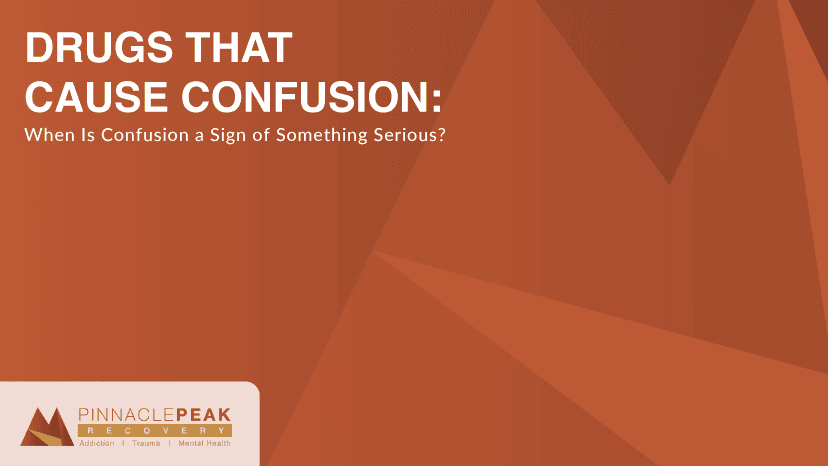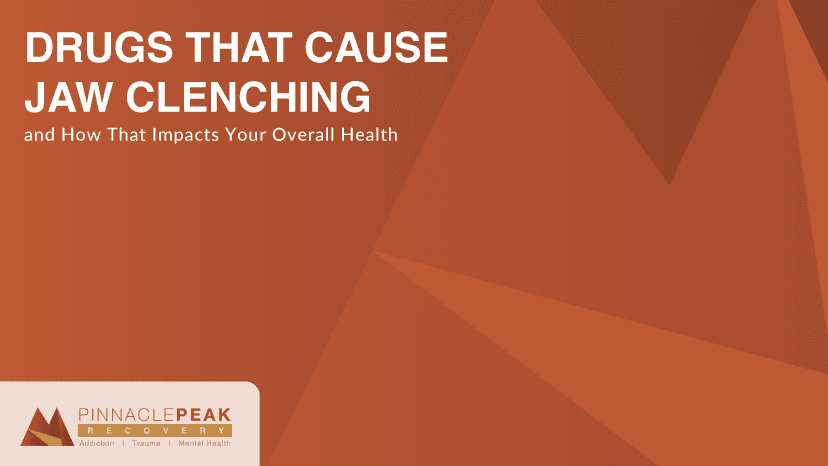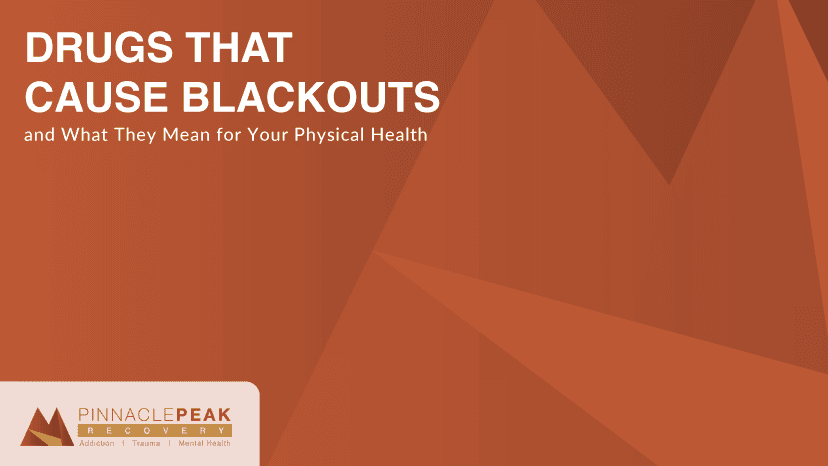Drugs That Cause Tooth Decay

About 90% of all adults in the United States have had at least one cavity. Cavities don’t mean your teeth are about to start rotting and falling out, but what exactly can lead to that? How do drugs affect dental hygiene and what about them specifically can lead to tooth decay, gum disease, and even oral cancer?
Over 600 types of medications, legal and illegal, can cause dry mouth, which is a leading cause of tooth decay. Poor hygiene and sugary diets can play a large role as well, and combined with dry mouth, the problem can become severe.

At Pinnacle Peak, we understand not all symptoms may seem as pressing as others. Things such as hallucinations, headaches, fatigue, and paranoia might take more precedence than dry mouth, but the long-term effects of dry mouth can be difficult to fix if not addressed.
Heroin, cannabis, methamphetamine, and cocaine are all known to cause dry mouth. Some of these can also cause cravings for food and sweets, which can also impact your dental hygiene. Alternatively, some of these substances can lead to demotivation and forgetfulness, making dental hygiene go out the window.
Here are some common symptoms associated with dry mouth:
- Thick or stringy saliva
- Bad breath
- A dry, rough tongue
- Chapped or cracked lips
- Difficulty eating drier foods
- A prickly or burning sensation in the mouth
- Tongue sticking to the roof of the mouth
Saliva helps get rid of bacteria that can eat away at the teeth, it has antifungal properties, it contains calcium and phosphate which can help prevent or even heal the damage caused by tooth decay, and much more. Low saliva production leaves the teeth and gums weak and at a much higher risk of damage and decay.
Drugs That Affect Tooth and Gums
Not all substances that can cause dry mouth also affect the gums. One of the types of substances that can lead to gum damage and disease are ones that are smoked. The smoke inside the mouth can lead to poor gum healing. In addition, substances such as cocaine, alcohol, or cannabis are tied to gum disease. Alcohol and cannabis both can leave the person at risk of gum cancer, and cocaine can damage the gums when users choose to rub it over their gums.
It’s also important to note that many times those struggling with substance use disorder can also struggle with personal hygiene as a result of the side effects of their substance use. This often carries over to dental hygiene.
Meth and Dental Hygiene
Methamphetamines are well-known for the damage they can cause to your dental health, so much so that the term “meth mouth” was invented.
Meth is highly acidic and can cause severe tooth decay in just a short amount of time. It attacks tooth enamel and also has side effects including dry mouth and teeth grinding.
Is Your Loved One Suffering From Heroin Addiction?
Call Us Today To Get Them Help!
Cocaine and Dental Hygiene
Cocaine carries a risk factor for dental health no matter how a person chooses to use it. When rubbed on the gums, it can cause ulceration and even damage the bone underneath. When cocaine is mixed with saliva, it becomes extremely acidic which erodes tooth enamel. The tooth enamel protects the dentine underneath of it, so when it's eroded away, this leaves your teeth vulnerable to decay-causing bacteria.
Heroin and Dental Hygiene
In addition to dry mouth, heroin can also cause those who partake to crave sweet things, which can be a deadly combination for dental hygiene. Dry mouth weakens the defenses of our teeth, and sweets are known to cause cavities.
Marijuana and Dental Hygiene
One of the potential side effects of marijuana, or cannabis, use is dry mouth. In addition, the gums being exposed to smoke inhalation on a frequent basis causes an increased risk of not only gum problems but also gum cancer.
Alcohol and Dental Hygiene
Most alcohols are acidic, which isn’t good for teeth. Regular consumption of alcohol can also lead to dry mouth and tooth erosion. This can lead to an increased risk of mouth cancer, especially when regularly consumed in combination with smoking.
Tobacco and Dental Hygiene
Over 40% of adults who currently smoke cigarettes have untreated tooth decay. People who smoke are also 3x more likely to lose all of their teeth within their lifetime. Cigarettes and other forms of tobacco come with a high risk of oral cancer and gum disease. Regular exposure of the mouth to smoke can also lead to other oral health problems.
Seeking Professional Help for Tooth Decay
Dental hygiene is important for many reasons, from preventing the pain of cavities, to difficulty eating certain foods. It’s never too late to change habits to better your dental health. If you start to notice signs of tooth decay, gum disease, or other forms of poor dental health, it’s not too late. You can start at home by addressing a few things:
- Sugary food and drink consumption
- How often you brush your teeth
- If you have dry mouth, work to combat that (by drinking more water, lessening caffeine intake, chewing gum to encourage saliva production)
If you or a loved one is struggling with dental health, it’s important to go see a dental professional. If your dental health is tied to substance use, it’s also important to seek out options for that as well. Treating one problem without addressing its root causes won’t make it go away in the long run.
If you want to learn more about treatment options from our detox program, give us a call 866-377-4761. We want to help you on all steps of your recovery journey.
Call Us To Get The Help Your Loved One Needs For Their Drug Addiction.
FAQs About Drugs That Cause Tooth Decay
Is it possible for a person that uses drugs to minimize tooth decay?
One of the most important steps to minimizing tooth decay is being aware of it. If any substances or medications you take are contributing to dry mouth, make sure you regularly drink water, don’t use mouthwashes that contain alcohol, and limit caffeine intake. Taking control of your dental hygiene by brushing regularly, flossing, and limiting sugary food and drink intake can all help minimize the risk of tooth decay.



